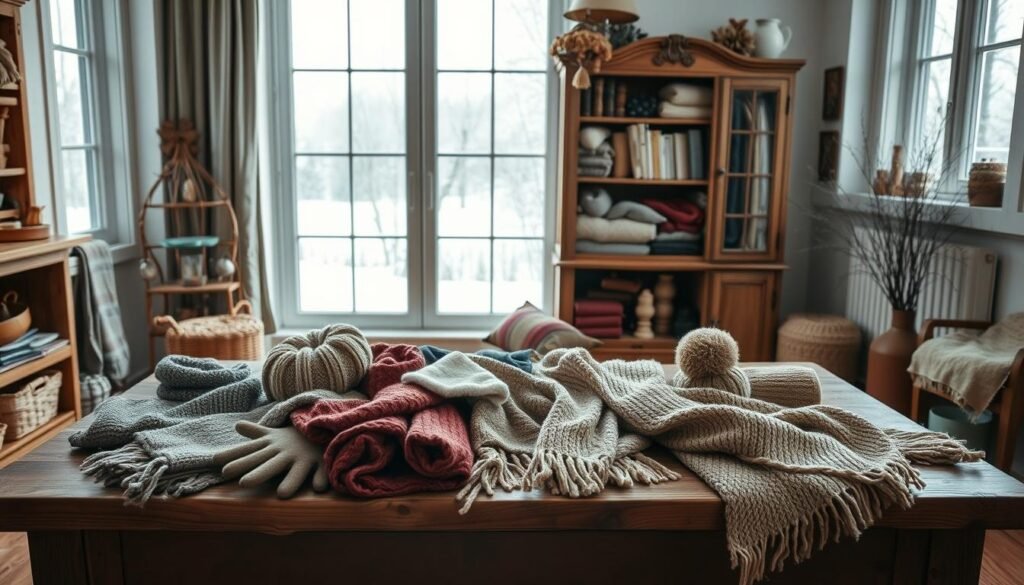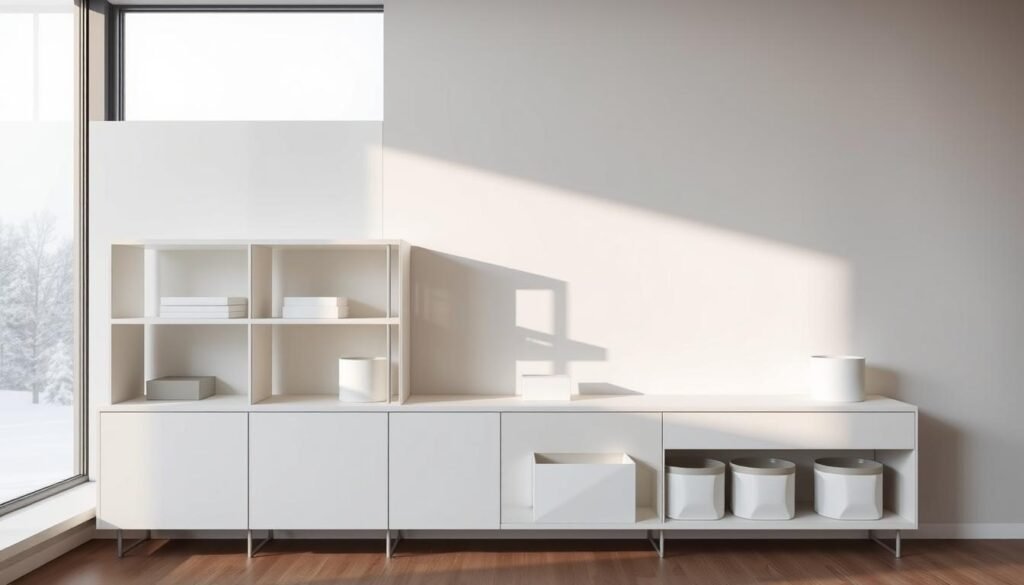This post may contain affiliate links. When you purchase through links on our site, we may earn an affiliate commission.
The transition from autumn festivities to holiday chaos can leave any space feeling overwhelmed. I used to dread the seasonal shift, tripping over mismatched gloves or digging through boxes of decorations. That changed when I discovered how intentional systems create calm amid the cold-weather frenzy.
My method starts with clearing out what no longer serves us. Summer gear gets stored, making room for cozy blankets and bulkier layers. Every item earns its place through practicality and joy – no more “just in case” clutter collecting dust.
I’ve learned that efficient storage isn’t about buying more bins. It’s about designing zones that adapt to daily needs. A designated spot for mittens by the door? Check. Accessible baking supplies for impromptu cookie nights? Absolutely.
This approach doesn’t just tidy physical spaces. It carves out mental breathing room for movie nights by the fireplace or hosting friends without stress. Less time searching means more moments savoring peppermint cocoa or wrapping gifts thoughtfully.
Key Takeaways
- Seasonal transitions require proactive systems to prevent clutter buildup
- Decluttering unused items creates space for current needs
- Multi-functional storage zones outperform generic containers
- Accessible organization reduces daily stress during busy months
- Intentional design supports both practicality and seasonal joy
Introduction: My Journey Toward a Clutter-Free Winter
Last December, I found myself surrounded by three mismatched mittens and a tower of unopened holiday cards. Cold-weather chaos had become my normal. That’s when I discovered a truth: hibernation habits breed disarray.
https://www.youtube.com/watch?v=xWWJNy9jyZ4
Why I Chose Simplicity This Season
Bulkier layers and festive decor turned my living area into a maze. I’d trip over boots while searching for cookie cutters. One snowy afternoon, I snapped. “Why does everything feel harder when it’s cold out?” The answer? Systems built for sunshine crumble under snowflakes.
I started viewing my environment through fresh eyes. That scarf I hadn’t worn since 2018? Donated. The tangled extension cords behind the sofa? Sorted. Each decision freed up physical and mental space. Less stuff meant more energy for what truly mattered.
What You’ll Gain From This Guide
This isn’t just about tidying up. You’ll learn how to:
- Create zones that adapt to snowy-day surprises
- Store seasonal items without losing them until spring
- Maintain order during gift-wrapping marathons
I’ll share my exact method for keeping entryways functional when wet coats pile up. You’ll get pantry solutions for soup-making sprees and closet hacks for bulky sweaters. Because let’s face it – nobody wants to hunt for mittens when the school bus arrives.
“Clutter multiplies in stillness. Movement – even small steps – keeps chaos at bay.”
By February, my approach had transformed frantic mornings into calm routines. I’ll show you how to design systems that work harder so you can relax more. Ready to reclaim your time and space? Let’s begin.
Setting the Stage for Minimalist Winter Home Organization
When the first frost painted my windows last year, I realized my usual storage habits wouldn’t cut it. Bulkier coats and holiday supplies demanded smarter solutions. That’s when I developed my three-step philosophy: purpose, placement, and peace.
Redefining Cold-Weather Priorities
My version of cold-weather simplicity means keeping only what enhances daily life. I ask two questions: “Does this make my days easier?” and “Does it spark joy?” Those fuzzy socks I never wear? Gone. The duplicate ice scraper? Donated.
This approach transformed how I use every corner. A bench near the door now stores boots and doubles as seating for guests. Clear bins under beds hold seasonal decor instead of random clutter.
Why Order Matters When Days Grow Dark
An orderly environment became my secret weapon against seasonal stress. Mornings flow smoother when gloves wait in labeled bins. Hosting feels effortless with dedicated beverage stations. Evenings feel cozier without visual chaos.
| Aspect | Traditional Approach | Intentional Method | Result |
|---|---|---|---|
| Entryway Storage | Piled coats | Rotating hook system | 75% faster exits |
| Kitchen Zones | Mixed-purpose counters | Hot drink station | 2-minute cocoa prep |
| Activity Areas | Cluttered surfaces | Rolling craft cart | Stress-free hobbies |
The real magic? How these systems support mental clarity. Less time searching means more energy for snowy walks or board game nights. When everything has its place, the whole family breathes easier – literally and figuratively.
Decluttering Winter Gear and Accessories
After New Year’s confetti settled last January, I faced a mountain of mismatched gloves and forgotten scarves. That’s when I developed my three-step purge method for cold-weather essentials. First, I corral every hat, mitten, and boot from closets, cars, and random drawers. Seeing everything together reveals surprising duplicates.

Tackling Gloves, Hats, and Scarves
I sort gloves first – singles get tossed immediately. Each family member keeps only 2-3 pairs that actually get worn. Hats undergo stricter scrutiny. If no one’s worn it in two seasons, it goes to shelters where others benefit.
Scarves used to tangle like holiday lights. Now, my “one casual, one dressy” rule keeps choices simple. This cut our collection by half while ensuring options for sledding days and dinner parties.
Deciding What to Donate or Toss
Boots tell their own story. I check soles for wear and toes for snugness. Cracked leather? Trash. Outgrown but intact? Donate. A designated box by the door collects cast-offs throughout the season.
This system freed up 60% of our storage space. No more digging through unused items when frost hits. Bonus? Local shelters receive timely donations right when temperatures drop.
Streamlining Home Storage and Boxes
Last January’s post-holiday cleanup revealed a startling truth: my storage areas had become cardboard graveyards. That’s when I developed a zero-box-clutter policy that transformed how I manage seasonal essentials. The key? Treating storage zones like curated exhibits rather than forgotten attics.

Efficient Storage Solutions for Seasonal Items
Clear plastic bins became my secret weapon. Unlike opaque containers, they let me spot holiday linens or ski gear instantly. I stick to uniform sizes for stacking – no more precarious towers of mismatched boxes.
Here’s what revolutionized my system:
| Storage Challenge | Old Method | Improved Solution | Space Saved |
|---|---|---|---|
| Winter Accessories | Cardboard boxes | Vertical hanging organizers | 40% |
| Holiday Decor | Mixed containers | Color-coded bins | 55% |
| Extra Bedding | Under-bed chaos | Vacuum-sealed bags | 65% |
I now break down delivery boxes weekly – only keeping three sturdy ones for donation runs. Labels do double duty, listing contents and storage dates. This helps identify unused items during annual reviews.
“Clear bins don’t just store things – they reveal what’s worth keeping.”
Vertical storage changed the game. Mounting shelves up walls created space for seasonal sports gear. Over-door pockets hold gloves and hats within arm’s reach. Best part? My family can find anything without unraveling my system.
Organizing Winter Clothing and Bed Linens
Last February, I discovered half my sweaters still had tags while searching for my favorite scarf. That wake-up call led me to develop systems that keep cold-weather essentials accessible yet contained. The secret? Combining ruthless editing with strategic placement.

The Hanger Trick: My Personal Method
Here’s how I maintain closet clarity: Every December 1st, I flip all clothing hangers backward. When I wear something, the hanger turns forward. Unused items stick out like sore thumbs by month’s end. This visual system exposes unworn pieces without emotional debates.
| Closet Strategy | Traditional Approach | Hanger Method | Time Saved Weekly |
|---|---|---|---|
| Decision Making | Guessing frequency | Visual tracking | 22 minutes |
| Space Usage | 80% capacity | 55% capacity | N/A |
| Donation Rate | 5 items/year | 18 items/year | N/A |
I store special occasion pieces higher up, keeping daily wear at eye level. This “frequency zoning” cuts morning prep time dramatically. Bonus? Rotating seasonal items prevents fabric fatigue.
Keeping Closets and Linens Clutter-Free
For beds, I follow the “two-plus-one” rule: two sheet sets plus one extra blanket per mattress. Flannel sheets replace cotton ones during colder months, stored in slim bins that slide under beds. Labeled containers prevent the “what’s in here?” guessing game.
My linen closet now features:
- Vertical shelves for folded blankets
- Breathable bags for off-season comforters
- A dedicated shelf for guest bedding
This system freed up 40% of our storage space. Now, grabbing extra pillows for movie nights takes seconds, not scavenger hunts. As my grandma used to say: “A tidy closet makes for warm toes and calm minds.”
Managing Holiday Decorations and Seasonal Decor
While untangling lights for the third time, I decided to revolutionize how we handle seasonal decor. My breakthrough came when I started treating holiday items like curated collections rather than temporary clutter.
Sorting and Storing Decorations
I now sort decorations while dismantling displays. This captures fresh memories of what worked. My three-bin system:
- Keep: Pieces used this year
- Share: Quality items for local shelters
- Preserve: Family heirlooms needing special care
Specialized containers prevent damage. Ornament boxes with dividers save 15 minutes per setup. Light reels stop the “twinkle light tango” frustration.
| Storage Type | Old Method | New Solution | Time Saved |
|---|---|---|---|
| Ornaments | Mixed in boxes | Compartmentalized cases | 30 minutes |
| Wreaths | Plastic bags | Breathable storage bags | N/A |
| Lights | Knots in bins | Cardboard spools | 45 minutes |
Creative Ideas for Family Keepsakes
I create memory totes for each child. These include:
- Handmade ornaments from school years
- Photos of our favorite holiday moments
- Special cards or letters from relatives
Labeled bins wait in our storage area until they’re ready to start their own traditions. This approach turns clutter into legacy without overcrowding our space.
“The best decorations aren’t stored in attics – they’re carried in hearts.”
Smart Kitchen and Pantry Organization for Winter
My cooking space became a battleground last year – expired spices hiding behind bulk purchases, lids playing hide-and-seek with pots. Now, I approach kitchen efficiency like a chess game, strategically placing every piece for maximum impact.
Revamping the Food Storage Strategy
I start with a pantry purge every November. Expired items get tossed immediately. Unopened, in-date goods go to community fridges. Clear containers transformed my shelves – now I see exactly what we have before buying duplicates.
Monthly expiration checks take 10 minutes. I rotate older items forward using restaurant-style FIFO (first in, first out). This simple habit slashed our food waste by 40% last season.
Optimizing Cooking Gear Accessibility
Damaged cookware got the boot – warped pans don’t belong in a functional kitchen. Daily drivers live on stove-adjacent hooks. Specialty tools? They’re in upper cabinets behind labeled bins.
My new system creates cooking zen:
- Soup pots hang within arm’s reach
- Baking sheets stand vertically in dividers
- Measuring cups nest beside mixing bowls
This setup isn’t just about saving space. It’s about reclaiming time for what matters – simmering stews, not searching for spatulas. When everything has its place, holiday meal prep feels like a breeze rather than a chore.

 using WordPress and
using WordPress and 
No responses yet